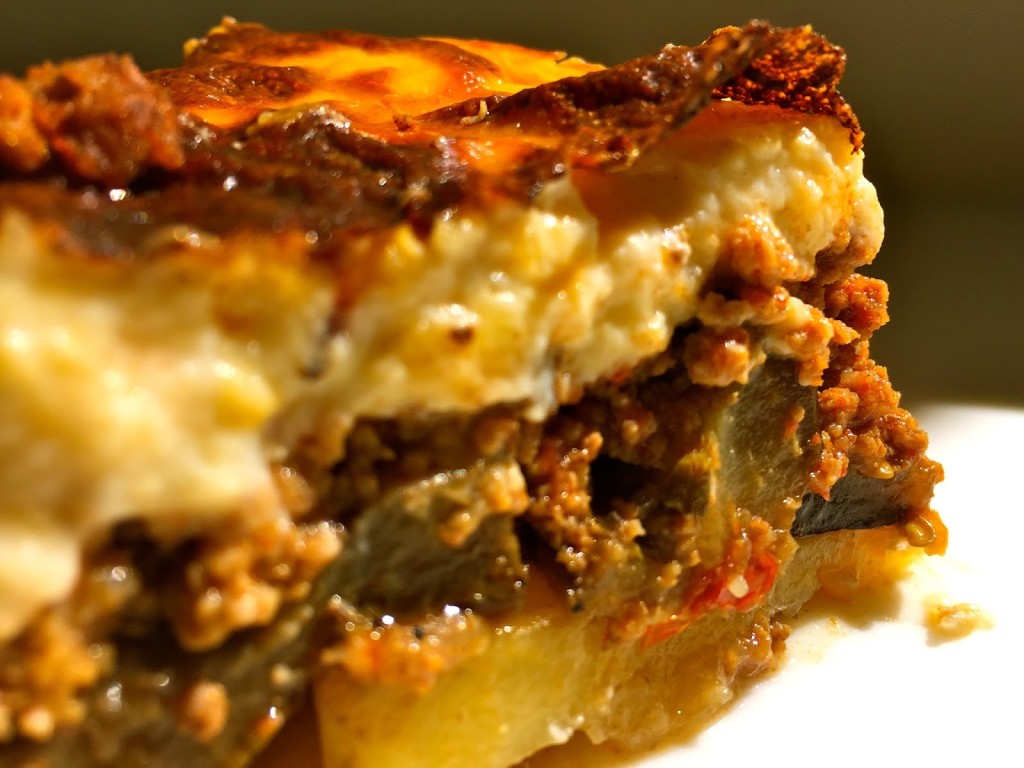 When you mention you’re a food blogger and a professional cook, the first thing most Greeks, and tourists, ask you is: “How good is your moussaka?’” It’s a decades-long cliché, but I love it!
When you mention you’re a food blogger and a professional cook, the first thing most Greeks, and tourists, ask you is: “How good is your moussaka?’” It’s a decades-long cliché, but I love it!
If, during Summer or Autumn, you find yourself with a whole morning free, then , why not, spend it making moussaka!
Moussaka is a rich lush food (but not as much as lamb slow-cooked with courgettes or aubergines), it’s a pain to make (but not as much as small stuffed vine leaves) and time consuming (but not as much as a good aspic or terrine).
There are two main pitfalls that need to be avoided when preparing moussaka: tastelessness and oiliness.
You’re also in trouble if you’ve left out the right spices (cinnamon, allspice in the minced meat and nutmeg in your béchamel sauce), the right amount of salt (on all layers of vegetables), and…woe betide you if you’ve used any other oil instead of olive oil for frying or if you’ve been slapdash with your frying!
Not to mention that, when cooking moussaka, you end up using the whole kitchen and all its appliances (saucepans, frying pans, oven, wooden spoons, egg beater, small pots…) for at least two hours! And that’s without all the cleaning up afterwards which will, literally, ‘steal’ your morning away from you without even realizing how!
Even though I adore moussaka, I never manage to cook it more than bi-weekly in the summer, when I have enough time not only for the cooking, but also for the cleaning up afterwards, or…good company for them both!
Sometimes I resort to often-used tricks (I cook the minced meat the previous day as a shortcut, I bake the aubergines and the potatoes, instead of frying them, I opt for the easy béchamel etc), but, try what I might, moussaka still remains that incredible, super tasty and well loved dish which demands that you devote time to it.
It deserves it!
Moussaka
Ingredients
For the meat
(For a 25 x 35 cm/10 x 14 inch baking tray and 8-12 portions)
- 4-5 round-bottomed aubergines cut in thick slices
- 4-5 potatoes peeled and cut in thinner slices than the aubergines
- A large chunk of green pepper
- 1 kilo (35.27 oz) minced meat
- 2-3 medium-sized finely chopped onions
- 1 whole garlic clove
- 4-5 rather large Pomodoro tomatoes ground to a pulp in a hand-held blender
- Salt/ pepper
- Oregano
- 1 stick of cinnamon
- 1 (Tbl) tablespoon sweet paprika
- 4-5 allspice
- 1 bay leaf
- 1 small glass of red or white wine
For the béchamel sauce
- 1 ¼ litre (33.81 fl oz) of full fat milk at room temperature or cold
- 125 gm (4.41 oz) fresh butter at room temperature or cold
- 1 (tsp) teaspoon grated nutmeg
- 3 eggs lightly beaten with a little salt
- 2 ½ (Tbl) tablespoon all-purpose flour
- 1 cup (236 ml/8 fl oz) grated cheese (such as Parmesan or any of your choice)
Preparation
Minced meat:
In a deep saucepan, and over a high heat, lightly brown the onion in some olive oil and then brown the meat, too, for 3-4 minutes, as well as the chunk of green pepper (it will be removed later, but for now, use it to add a lovely natural aroma to your minced meat).
Stir with a wooden spoon and cover the pot with a lid, so that the meat can be cooked properly and take in hints of the onion smell.
Uncover the pot when the minced meat has ‘soaked up all its juices’, as well as the onion juices. Add the wine. Let it cook until all liquids have evaporated and the saucepan bottom is dry. Make sure to stir often.
Add the tomato pulp and the remaining ingredients.
Cover and let the meat cook on a high heat, until it’s completely dry. Don’t add any more liquids (the way we do when preparing a spaghetti Bolognese sauce), because the dish will be too watery. The aubergines will also release a fair amount of juices whilst baking, so the potatoes will become tender and everything will cook just perfectly. The minced meat is ready when the bottom of the pot is dry. Remove the cinnamon stick, the allspice (as many as we can find!) and the bay leaf.
Aubergines and potatoes:
Lay the sliced aubergines on a clean surface and salt them well. Leave them for about 30 minutes to ‘sweat out’ their juices (in other words, until small droplets of water appear).
Rinse off the aubergines and squeeze them between your hands to get rid of most of their juices.
Preheat the oven at the highest temperature.
Place the aubergines on one non-stick greased tray and the potatoes on another, having brushed their top sides with a little oil.
Sprinkle salt and pepper on both vegetables. Bake until the potatoes are a light golden colour and the aubergines are soft (about 20 minutes).
Grease the moussaka tray (just a little) and place first the potatoes, then the aubergines in two layers, filling in the gaps with the smaller bits of vegetables.
Add the minced meat on top.
The béchamel:
Ha! And here we laugh! The béchamel! It’s one of the fundamental sauces of French cuisine. A real pain if you do it the traditional French way of melting the butter and incorporating the flour gradually, and then beating the hot milk with an egg beater. My béchamel is a lot faster, but it is tiring, as you have to beat continuously.
Choose your method of preferance.
Add the milk, the butter (both cold) and the flour in a deep saucepan and place over a high heat.
Keep beating right from the start and as soon as the smooth béchamel begins to thicken and requires more effort from you, then you can remove it from the fire. Add the grated nutmeg, the cheese (to cool it down), then beat in the eggs briskly.
Pour this over the minced meat and vegetables in the tray.
Bake your moussaka at 180C/356F in a fan-assisted or convection oven for an hour (you’ll need that amount of time to clean up!). Don’t worry if the béchamel starts turning a little black at the edges, but if you don’t like that, just lower the heat intensity near the end.
Let the moussaka cool down for 15 minutes or longer, so that it’ll be easier to cut up.
Moussaka is never eaten sizzling hot, but warm. My humble opinion, of course. And, may the fans of ‘only aubergines, never potatoes in moussaka!’ forgive me…I agree with them two out of three times.
Bon appétit!























